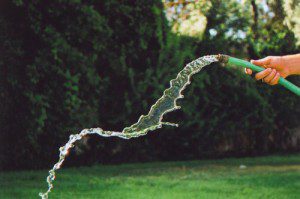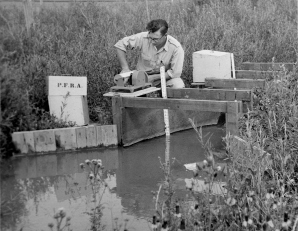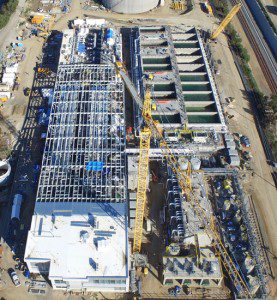
I saw a man in Toronto, the other day, doing the most decadent thing you can imagine. He was washing a bunch of leaves down the street with water from his garden hose. Spraying the water, full blast, onto the asphalt!
“Where’s your head?” I almost shouted at him, but didn’t. “Up your… hose?”
A good portion of the country – including parts of Ontario – has sweltered through a heat advisory this past week, with temperatures soaring and water in greater demand than usual. It seemed half of Saskatchewan was going up in flames with wild fires forcing nearly 3,000 people in the northern community of La Ronge from their homes in case firefighters couldn’t hold back the inferno.
Then, there’ve been parts of British Columbia, home of some of the largest, wettest rain forests on the planet, facing drought like never before. And, for the first time in a dozen years, the municipal government of Metro Vancouver has imposed a ban on all lawn sprinkling and car washing.
“We’re in uncharted territory,” Mayor Darrell Musatto told the CBC. “We’re under great stress at the reservoirs; consequently we have to reduce our consumption.”
All you have to see is one of those firefighting stories on the news to realize how critical the problem has become. Just watching those massive old forest pines exploding like match sticks instantaneously, or witnessing blazes leaping from mountain side to mountain top and back down again, or realizing how futile each pass of a water bomber appears to be despite dropping tonnes and tonnes of water on the flames. Especially on the prairies, such dramatic droughts are so magnified by blazes such as the one around La Ronge last week.
I think I first came to realize the critical nature of water on the prairies, the first spring my wife and I lived on an acreage about a half-hour outside Saskatoon. Because I had practised the habit of planting evergreen seedlings each spring here in Ontario during the 1960s, I decided to do the same on our acreage in Saskatchewan in the 1970s. As here in Ontario, I drove to the provincial tree plantation to pick up the bundles of spruce and pine saplings (a bundle the size of a suitcase could contain up to 1,000 saplings). I cut open the turf where I wanted the evergreens to grow.

Then, for the balance of the summer, almost every evening as the heat of the day subsided, I drove my small pickup truck with a 40-gallon drum of fresh water perched in the back along the rows of evergreens. And I doled out a pail or two of water to each tree. Then, I watched, as the sandy soil sucked away the water that had barely dampened the base of each sapling. I can’t recall for sure, but despite my diligent daily watering, perhaps one in 10 survived.
A water quality engineer with Saskatchewan’s Prairie Farm Rehabilitation Administration recently summed up the crisis facing farmers and civilians alike. Here’s what Darrell Corkal told delegates to conference on climate change:
“We can’t be complacent about water and climate,” he said. “Our major drought in 2001-2002 was a two-year duration drought, but it was more extensive than the drought in 1931…” And he didn’t stop there. “Repeated droughts in the past are expected to occur in the future, whether or not we believe in climate change.”

And whether we believe in climate change or not, some of the most populous areas of the world have began taking matters into their own hands. For better or worse, parts of the arid Middle East and the southwestern United States have resorted to dangerous water diversion and draining the deepest aquifers underground dry, in order to quench the thirst of major cities in natural desert areas. And some of the coastal cities in California are borrowing desalination techniques from Israel to transform ocean water to household drinking water.
Earlier this year, Reuters reported on the construction of the $1 billion desalination plant in Carlsbad, California. By November, the facility will deliver 50 million gallons of fresh water a day to San Diego County (enough to fulfil the requirement of 112,000 households).
Drought, diversion, desalination, if not a symptom of climate change, they spell acute water shortages everywhere. And they make jerks on streets chasing leaves with hose water all the more absurd.
Maybe Canada needs to introduce the instructive habits that the original Earth Hour activists did in 1970. For the past few years, on the last Saturday evening in March, electrical energy conservationists have successfully managed to get us to turn off our lights for an hour. And for the water-saving equivalent, I’ve even got a slogan (I’ll admit comes from one of those head shop posters of the 1960s) that might get people to act.
“Save water. Shower with a friend.”